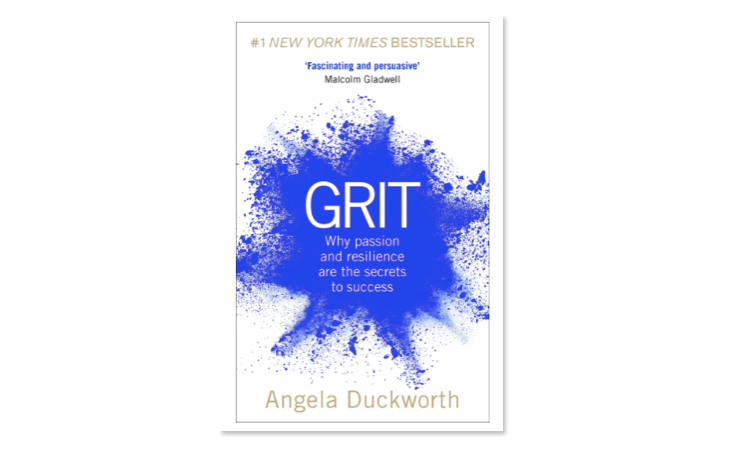Mindset is highly popular, fascinating and complex topic. The more complex one thing gets, the more important it is to make it as simple as possible. To create a high rate of applicability and success. When it comes to the analysis and development of mindset one of the top 2 books and concepts I have come across in the last years is Grit.
“If we think of genius as something magical, we are not obliged to compare ourselves and find ourselves lacking.” Friedrich Nietzsche
Angela Duckworth, a psychologist and author has made “Grit” a reigning buzzword. Grit is a skill. Grit is characterized by the combination focused passion with focused perseverance. Its basically:
Talent × effort = skill.
Skill × effort = achievement.
In other words, “Effort counts twice.”
The two big ideas about grit that have made Duckworth famous are:
- Grit predicts success more reliably than talent or I.Q.
- Grit is a skill. Everyone can learn and improve it.
She gives many examples throughout the book to explain the concept of Grit in real life. One of the first is an analysis of the applicants success from to receiving a spot to completing a degree in one of the most decorated military schools in the US, the West Point Military Academy. Every year they receive over 11.000 applications from who about 10% are selected with a very thorough interview process to receive a spot at the school. Despite this thorough selection process almost 20% of the students drop out in the first six weeks of the first year which are also known as the „beast barracks“. Which is an intense selection process with high physical and mental pressure and demands. Similar statistics are seen in special forces all over the world, during the so-called „hell week“. A week long selection process of extreme physical and mental pressure and demands. Despite thorough selection upfront and having trained months and even years for this week 60-90% of applicants will drop out during „hell week“. Which basically means that the application and interview process is inefficient as it can’t predict at a high rate who will succeed. According to Duckworth’s research Grit is the major factor that allows them to succeed and therefore needs to be tested for.
At West Point she developed a „Grit Test“. Half of the questions were about perseverance. And the other half of the questions were about passion. And it turned out that the Grit Scores bore absolutely no relationship to the Whole Candidate Score. And Grit turned out to be an highly reliable predictor of who made it through and who did not.
Continued research gave her fundamental insight that guided her future work:
Potential is one thing. What we do with it is quite another!
In her book she also quotes researchers, actors, athletes and other high-achievers such as:
In 1869, Francis Galton, published one of the first studies of high achievement. These successful, outliers, Galton said were remarkable in three ways:
- Ability
- Zeal
- The capacity for hard labor
“For I have always maintained that, excepting fools, men did not differ much in intellect, only in zeal and hard work; and I still think this is an eminently important difference.” Charles Darwin, English naturalist, geologist and biologist, best known for his contributions to the science of evolution.
“The separation of talent and skill is one of the greatest misunderstood concepts for people who are trying to excel, who have dreams, who want to do things. Talent you have naturally. Skill is only developed by hours and hours and hours of beating on your craft.” Will Smith, Grammy-award winning musician, Oscar-nominated actor
“Pitching . . . determines what I eat, when I go to bed, what I do when I’m awake. It determines how I spend my life when I’m not pitching. If it means I have to come to Florida and can’t get tanned because I might get a burn that would keep me from throwing for a few days, then I never go shirtless in the sun . . . If it means I have to remind myself to pet dogs with my left hand or throw logs on the fire with my left hand, then I do that, too. If it means in the winter I eat cottage cheese instead of chocolate chip cookies in order to keep my weight down, then I eat cottage cheese.” Baseball pitcher Tom Seaver, elected into the Hall of Fame with highest-ever percentage of votes (98.8%)
She also quotes legendary investor Warren Buffet who gave a friend a 3-step process for prioritizing goals which clearly outline selection based on the primary pillars of grit – passion and perservernace:
- Write down a list of 25 career goals.
- Soul-search and circle the 5 highest priority goals. Just five.
- Look at the 20 goals you did not circle – avoid these at all costs – they distract you.
How to create Grit
After the definition of what Grit is, the most important question is, how can one increase his Grit. Every human trait is influenced by both genes and experience. Nature matters and so does nurture. Talents are also genetically influenced, especially in the context of sports. Yet talents are not entirely genetic. The rate at which we develop any skill is also a function of experience. And Duckworth points out four psychological assets of true Grit:
1. Interest
Passion begins with intrinsically enjoying what you do.
2. Practice
Daily discipline of trying to do things better than we did yesterday.
To be gritty is to resist complacency.
3. Purpose
Passion ripens with the conviction that your work matters.
Imperative to identify your work as both personally interesting AND integrally connected to the well-being of others.
4. Hope
A rising to the occasion kind of perseverance.
Hope doesn’t define the last stage of grit – it defines every stage of grit.
Another interesting point is that Duckworth believes that the one thing essential for a high level of Grit is a „Growth Mindset“. This term has been defined and popularized by Stanford researcher Dr. Carol Dweck in her book „Mindset“. This book is on the recommended literature list of the YPSI Trainer B-Licence since Day 1 and its a concept that I consistently speak about at seminars. A „Growth Mindset“ is a mindset that believes in continuous progress and deliberate work over set talent and fixed genetics.
In this context, Duckworth also offers a four-step program to develop Grit which looks like this in short:
- Identify a burning interest
- Practice it a lot
- Develop a sense of higher purpose, by which Duckworth means I must believe that my passion will improve the world.
- Overcome pessimism by cultivating a “Growth Mindset“.
Simple, but not easy.
In conclusion
Whatever one wants to achieve, in the context of training this can be the first pullup, the first 200kg squat, putting on 15kg of leanmass, loosing 10% or just the drive to maintain healthy food choices and a healthy lifestyle for an extended time, Grit is essential. Without Grit success is hard to achieve.
I highly recommend everyone to read this book and practice Grit.
To build more Grit…
You can order the book right here on amazon
Die deutsche Übersetzung des Buchs gibt es ebenfalls direkt hier auf amazon
You call also watch Angela Duckworth Ted Talk here
Picture: The book cover.

